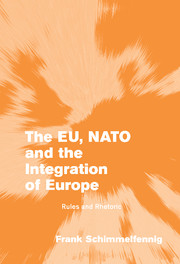Book contents
- Frontmatter
- Contents
- List of figures
- List of tables
- Acknowledgments
- List of abbreviations
- Introduction
- PART I Security, power or welfare? Eastern enlargement in a rationalist perspective
- PART II Expanding the Western community of liberal values and norms: Eastern enlargement in a sociological perspective
- 4 Sociological institutionalism and the enlargement of regional organizations
- 5 Eastern enlargement and the Western international community
- 6 The event history of enlargement
- Conclusion: the sociological solution to the enlargement puzzle
- PART III Association instead of membership: preferences and bargaining power in Eastern enlargement
- PART IV From association to membership: rhetorical action in Eastern enlargement
- Strategic action in international community: concluding remarks
- Appendix (Interviews)
- List of references
- Index
Conclusion: the sociological solution to the enlargement puzzle
Published online by Cambridge University Press: 22 September 2009
- Frontmatter
- Contents
- List of figures
- List of tables
- Acknowledgments
- List of abbreviations
- Introduction
- PART I Security, power or welfare? Eastern enlargement in a rationalist perspective
- PART II Expanding the Western community of liberal values and norms: Eastern enlargement in a sociological perspective
- 4 Sociological institutionalism and the enlargement of regional organizations
- 5 Eastern enlargement and the Western international community
- 6 The event history of enlargement
- Conclusion: the sociological solution to the enlargement puzzle
- PART III Association instead of membership: preferences and bargaining power in Eastern enlargement
- PART IV From association to membership: rhetorical action in Eastern enlargement
- Strategic action in international community: concluding remarks
- Appendix (Interviews)
- List of references
- Index
Summary
In this part, I have developed and applied a community approach to enlargement on the basis of sociological institutionalist assumptions. According to this approach, states seek to join and are admitted to regional organizations if they share the identity, values and norms of the international community these organizations represent. NATO and the European Union are European organizations of the Western international community. I therefore hypothesized that they would admit those CEECs which have come to share the liberal identity of the Western community and have internalized its liberal norms of domestic and international conduct.
To evaluate the community approach and the liberal community hypothesis, I have drawn on three kinds of empirical evidence. First, the formal rules of NATO and the EU show that liberal identity, values, and norms are constitutive for the organizations and their enlargement. Second, the official discourse on enlargement demonstrates the organizations' commitment to their community-building mission and the priority of the liberal community rules as criteria for the selection of new members. Third, on the behavioral dimension, the selective establishment of institutional relationships and the opening of accession negotiations with the CEECs seems to be strongly correlated with the degree to which CEECs comply with the community rules and have institutionalized liberal democracy.
On this evidence, the community approach is able to explain why the Western organizations are prepared to admit CEECs in spite of net material costs for their members.
- Type
- Chapter
- Information
- The EU, NATO and the Integration of EuropeRules and Rhetoric, pp. 152 - 154Publisher: Cambridge University PressPrint publication year: 2003

